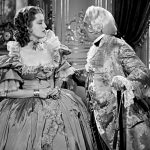
Naughty Marietta – 1935
What was it about Marietta that made her so naughty? At first I thought it was the fact that she ran away from being a French princess with an arranged marriage to the evil, old Don Carlos. But I was wrong. She was naughty because she was sexually aroused by Nelson Eddy’s voice. Oh, Marietta, you naughty girl.
OK, this movie was a nice little romantic musical. It had a somewhat ridiculous story, an embarrassingly ridiculous ending, and some nice singing along the way. Jeanette Macdonald played Princess Marie de Namour de la Bonfain. In order to run away from her royal duties, she trades places with a scullery maid and boards a boat to New Orleans along with a group of women contracted to be the brides of rough frontiersmen. They are set upon by pirates, but are quickly rescued by a group of mercenaries led by Captain Richard Warrington.
Warrington takes a quick liking to the Princess, who now wears the clothes of a commoner, and calls herself Marietta. But he comes on too strong and she, being the stuck up girl of royal breeding that she is, turns her nose up at him and declares that she does not intend to marry, despite her stolen name and the contract of intended marriage on which that name is written. But the Captain is persistent, and he sings to her some more, arousing the girl even more.
Eventually his charms win her over and the two fall madly in love. But tragedy strikes when Marietta’s stern and uncaring old uncle, Prince de Namour de la Bonfain, played by Douglas Dumbrille, arrives with Don Carlos de Braganza, played by Walter Kingsford. Marietta is tracked down, captured, and forced to return to her life as the Princess. The evil old men warn Princess Marie that if Captain Warrington attempts to rescue her, he will be executed. But he comes anyway, and the two lovers sing the duet Ah, Sweet Mystery of Life, declaring their love for all the world to see. Then he sneaks her out of the bumbling Governor’s palace, the Governor being played by Frank Morgan, an actor who seems to have the bumbling yet kindly father figure down to a science. Warrington is helped by his loyal mercenary friends. The two ride off into the wilderness, singing of their shared bliss. The end.
Or is it? Yes, that is where the movie ended. But I can’t help but see the glaring flaws with the plot’s inane and contrived closure. Let’s take a look at this realistically, shall we? First, Don Carlos has sailed across the Atlantic to recapture his young bride. You don’t think he would send scores of soldiers to track her down again, have Warrington killed on sight, and bring her back in irons, if necessary?
Also, think about it. Even if they were able to elude Don Carlos, the Princess has never worked a day in her life, other than singing in a peasant puppet show for a day. She can’t cook, she can’t sew, and she isn’t at all fit for manual labor. This is the frontier of the 1740s. The happy couple’s marital bliss would quickly disintegrate as soon as reality set in. If the Princess didn’t die of some disease or in childbirth, she would be in for a rude awakening when her husband expected her to pitch in around the farm to help keep them alive. Her delicate hands would soon be rough and blistered as she learned to milk cows and churn butter. Her beautiful skin would grow worn and burnt as she labored under the sun with her husband. But the implication is that love is all that matters for true happiness.
This movie is pure fantasy and escapism. In the beginning, the Princess lives in a city with clean and attractive peasants who all love her for her kindness, her generosity, and her beautiful singing voice. Her escape from the evil Don is unbelievably simple and nobody died while crossing the Atlantic. Her handsome Captain is masculine and heroic as he sweeps her off her feet, despite her protestations. It was exactly what audiences of the 1930s wanted to see: rich people falling in love and being happy.
And then there was the music which was mostly unmemorable, except for Ah, Sweet Mystery of Life. Just watch out for some of the other songs like Tramp Tramp Tramp, in which Warrington and his men sing their marching song with lyrics like, “Tramp, tramp, tramp. We march together where the tropic sun is riding, or the moon is in the sky. We must go where danger’s hiding, ready to do or die. O, you fighting sons of wildcats, are you with me wrong or right? Then follow where I go to meet the savage foe. Here’s to men who love a fight.” Such lazy writing. This isn’t a song. This is either character or group introduction, or simple exposition forced into a melody, uncomfortably heard and quickly forgotten.
So what am I saying? Was it a bad movie? No. Was it an unrealistic fantasy? Yes. But does that make it impossible to enjoy? No. MacDonald was good, as usual. Nelson Eddy was handsome and had a good enough voice, though unlike Macdonald, his face turned to an expressionless mask whenever he was singing, and some of his vowel production was a little inconsistent. And despite my protestations, this kind of a happy ending is usually pretty palatable.








